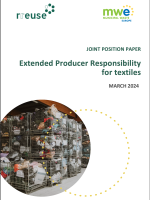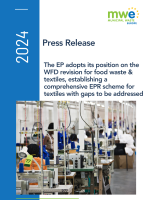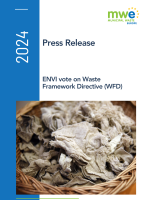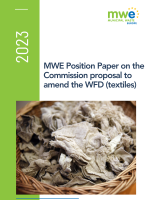Amendments to the Council Proposal for the Waste Framework Directive (WFD)
Dear Permanent Representatives,
Dear Members of the European Parliament,
Dear European Commission,
In addition to the proposals we have signed in conjunction with other EU level organisations with reference to the revision of the Waste Framework and Landfill Directives, Municipal Waste Europe would like to share with you the following reflections on current discussions.
Definition:
Art.3.1a.c:
Delete: 'large commerce and industry' and 'septic tanks'
Justification: 'large' is not defined and will cause implementation difficulties and distortions between member states. Septic tanks are emptied and the waste managed by municipalities in many member states.
Extended Producer Responsibility:
Art.8 paragraph 1
Delete: 'Extended producer responsibility schemes that are established on a voluntary basis may be exempted from the general requirements in article 8a'.
Justification: This new addition by Council has the effect of invalidating the general requirements and could spread to existing producer responsibility organisations (EPR schemes). If a scheme does not follow the general requirements then it is simply not an EPR scheme in accordance with European law.
Art.8a
3d) third indent:
Add: - the selection procedure for waste management operators in cases where they have this responsibility as stated in their permit
4d):
Delete: 'Where justified by the need to ensure the proper functioning of waste management, Member States may depart from the division of financial responsibility for separate collection as laid down in 4(a) while ensuring that the producers bear the predominant share of the related costs.' Justification: 4(a) provides a cost structure which has been missing until now with the result that each PRO sets up its own system for paying municipalities for the service of separate collection and all that it entails, with many municipalities receiving little or no reimbursement for their costs. It is a key part of the general requirements, which will enable better implementation of EPR, of separate collection and result in more and better quality recovery of materials from the waste stream and fairer treatment of both municipalities and the obliged industry. The new 4(d) negates all this by offering an exemption to 4(a) and therefore should be deleted in its entirety.
Waste Hierarchy:
Two amendments were brought into the last version of the Council document which undermine the achievement of recycling and the application of the waste hierarchy following the definition of recycling in the waste framework directive and following the intention of Art.11:
Art.3.17 (EP Plenary): "recycling" means any recovery operation by which waste materials are reprocessed into products, materials or substances whether for the original or other purposes. It includes organic recycling but does not include energy recovery and the reprocessing into materials that are to be used as fuels or for backfilling operations;";
Art.3.17a (EP Plenary): "organic recycling" means recycling in the form of an aerobic or an anaerobic treatment, or another treatment of the biodegradable parts of waste, which produces products, materials or substances; mechanical biological treatment and landfill are not considered to be a form of organic recycling;";
Art.11.1 (Council): Member States shall take measures to promote high quality recycling and, to this end, shall set up separate collection of waste where technically, environmentally and economically practicable and appropriate to meet the necessary quality standards for the relevant recycling sectors';
Proposed Amendments:
Art.11a.4a:
For the purpose of calculating the targets laid down in Article 11.2(c) and (d) and Article 11.3 the amount of biodegradable waste that enters aerobic or anaerobic treatment may be counted as recycled where that treatment generates compost or digestate, or other output with similar quantity of recycled content, which is to be used as a recycled product, material or substance. The weight of waste that enters aerobic or anaerobic treatment that is not subsequently recycled but sent to landfill, incineration or co-incineration, is not included in the weight of waste reported as recycled. Where the output is used on land, it may only be counted as recycled if resulting in benefit to agriculture or to ecological improvement.
Art.11a.5:
For the purpose of calculating whether the targets laid down in Article 11.2(c) and (d) and Article 11.3 have been achieved, Member States may take into account:
a) the recycling of metals separated after incineration of municipal waste provided that the recycled metals meet certain quality requirements.
b) DELETE (Co-incineration is not recycling)
Thanking you in advance for your consideration of these key points,




